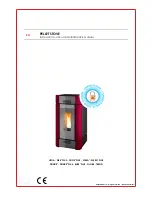
NOV12GB Issue 2
19
Recommended Fuels
This appliance has obtained CE EN13240 approval for burning –
* HETAS approved coal suitable for a closed appliance.
* Split Wood logs not exceeding 35cms in length and not over 20% moisture content.
Approval does not cover the use of other fuels either alone or mixed with the suitable fuels
listed above.
Although approval covers the use of the smokeless fuels listed, the claimed rated output,
has been obtained burning a single representative smokeless fuel, under standard test
conditions. However, in the home, a variety of operating conditions can occur and the
performance of the appliance may vary to some degree with these conditions and different
fuels may need to be burnt at different rates to provide the same heat output.
The recommended fuels are Wood logs no longer than 35cms (dry, seasoned to under
20% moisture) and solid mineral fuels (e.g. Natural smokeless fuels) Larger coal briquettes
are recommended as they concentrate less heat in one spot reducing the likelihood of
damage to the grate. Ask your local fuel merchant or consult the HETAS website for more
details on these fuels.
Only authorised smokeless fuels may be used in smoke control areas.
Do NOT burn “Housecoal” or any other coal which are intended for use on open
fires.
Suitable coal needs to be designed for use on closed appliances. Open fires send a
large amount of heat up the chimney therefore the fuel needs to burn extremely hot in
order to send heat into the room, closed appliances are highly efficient and send little heat
up the chimney therefore the fuel does not need to burn as hot. Using open fire coal on a
closed appliance will cause excessive wear on the stove and could result in damage which
will not be covered by the products warranty.
Under NO circumstances burn “petroleum coke”
or any other chemically enhanced
fuel as it will burn out the internal grate and baffle plates in a very short period of time and
may damage the stove beyond repair.
Do NOT burn wet wood,
This will give a poor heat output and will cause heavy deposits
of soot and tar to accumulate on the glass and throughout the stove and flue. Tar and soot
build-ups will also insulate the boiler causing poor heat transfer to the water, the coating of
soot and tar in the chimney is volatile creating a high risk of chimney fires. A growing tree
contains a high percentage of water, the wood needs to be dried out (seasoned) before it
is suitable for burning (this can take several years). Wood logs are best stored in a stack,
sheltered from the weather, in a well ventilated area and raised off the ground. This allows
the air to circulate and prevents mildew.











































